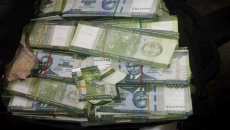Liberia’s economy is currently experiencing its second major foreign exchange rate upheaval since Pres. George Weah took office. The IMF has already revised its estimate for economic growth for the country from 4.7 to 0.4 percent.
Additionally, the Liberian dollar has depreciated against the U.S. dollar by at least 27 percent since the beginning of the year. At the end of January, the Central Bank of Liberia itself ranked Liberia’s currency as the worst in depreciation over the past year against the U.S. dollar, of all currencies in the West African Monetary Zone (those not using the West African CFA). The situation has gotten drastically worse over the past two weeks as the exchange rate increases significantly each day. The Central Bank’s official rate is 170 Liberian dollars to one U.S. dollar; however, on the streets of Monrovia, 173 is a much more common rate.
All this turmoil makes it worth asking whether Liberia is better off picking one currency and sticking to it. Be it the U.S. dollar or the Liberian dollar, selecting either option will come with its costs and benefits. To truly understand what Liberia could lose or gain by switching to either currency, we asked the Liberian economist, Prof. George Gonpu, to give us some insights. Gonpu teaches economics at Ramapo College of New Jersey and holds a Ph.D. from the University of Illinois.
The following are questions we asked Gonpu and his corresponding responses. They have been edited for clarity.
What does the Central Bank of Liberia have to lose if we switch completely to the U.S. dollar? Additionally, what would be additional considerations or obligations of the Central Bank if it were now using the U.S. dollar?
If that happened, the Central Bank would be relinquishing control of monetary policy and essentially outsourcing it to the U.S. Federal Reserve System. Monetary policy involves the power to decide the quantity, type, and quality of money that circulates in the economy. When monetary policy is effectively conducted, it can influence interest rates, savings, capital formation, employment, GDP, and economic growth.
If such a powerful resource for economic management is outsourced to another country whose interest and policy goals do not consider Liberia’s policy goals, such action would leave the Central Bank and the Liberian government powerless in using monetary tools to respond to future external or domestic economic shocks.
Normally, a central bank should be a lender of last resort in an economy. For example, when commercial banks or the government face a shortage of funds and private financing is not available, they should be able to turn to their central bank for short-term financing. Hence, if Liberia fully adopts the U.S. dollar as its only currency, the Central Bank will lose its power as lender of last resort.
Liberia would also lose seignorage. Seignorage is the benefit of revenues which are derived by being able to print money. It can be a significant amount of revenues, which depends on the size of the economy and its growth rate. For example, when the Central Bank prints L$5 billion, its cost is simply the amount it pays to the printing house plus transportation to get it into its vault. Subtracting the printing and transportation cost from the value of what was printed gives the value of the seignorage, which is revenue that can purchase goods and services in Liberia. All of this revenue is given up to the U.S. when Liberia or any country adopts the U.S. dollar as its currency.
Liberia will also incur the conversion cost and other recurrent costs. If Liberia adopts the U.S. dollar, it will have to convert all Liberian dollar bank deposits and currency in the public (held by individuals and businesses) into U.S. dollars. The Central Bank would need to have an adequate holding of U.S. dollar to support such conversion. In addition, the U.S. Federal Reserve will have to agree to regularly ship U.S. dollars to Liberia in order to ensure adequate liquidity in the Liberian economy. The Central Bank of Liberia will be obligated to provide payments for that transaction.
What are the pros and cons if Liberia started using the Liberian dollar as its sole currency?
For one, inflation – currently the Central Bank of Liberia’s independence is limited and it has mainly followed a political business cycle where it bows to the wishes of politicians. In order to be popular, most politicians prefer to spend money without raising matching revenues. Accordingly, they have used the Central Bank as a source of funds through demanding and encouraging it to print Liberian dollars to finance their government budget deficits, especially during presidential election periods.
In the absence of a disciplined, competent, and a strong leadership team at the Central Bank and the Ministry of Finance who are able to protect the Central Bank from politicians who influence the Bank’s monetary policy decisions, Liberia’s inflation rate is likely to stay high or rise with the use of the Liberian dollar as a sole currency.
There’s also the chance for increased uncertainty and economic instability. Due to limited transparency in the conduct of monetary policy, as well as the level of fiscal indiscipline in the government, a prompt switch to the Liberian dollar may increase the level of uncertainty and reduce the demand for the Liberian dollar further, and result in further depreciation of the Liberian dollar.
Given the limited confidence in the issuing authorities of the Liberian currency, the desire to use it as a store of wealth or as a unit of account for contracts is likely to decrease further if it promptly becomes the only currency. People could likely turn towards the use of other currencies or assets as a store of their wealth and for their contracts.
Another phenomenon we could witness is financial disintermediation. Commercial banks would lose their deposit of the U.S. dollar account if the Liberian dollar is the only legal tender. Those depositors will withdraw their funds and save it at home or in other foreign countries. Instead of financial institutions serving as a source of loans for U.S. dollars, borrowers would be forced to approach the owners of U.S. dollars directly if they wish to borrow. This will cause banks to lose business, profits, and may even result in layoffs at some financial institutions – and eventually, shutdowns of some.
In summary, each of the policy actions – Liberian dollar only or U.S. dollar only – has its benefits, but also huge costs. U.S. dollar only will bring less inflation, more certainty, and promote fiscal discipline, but it may cause a reduction in the Central Bank’s power and a deeper recession in the short run.
Liberian dollar only will increase uncertainty, depreciation, inflation, fiscal indiscipline, and instability, but may provide an opportunity for Central Bank intervention through the use of monetary policy.
Featured image courtesy of  Teddy James



